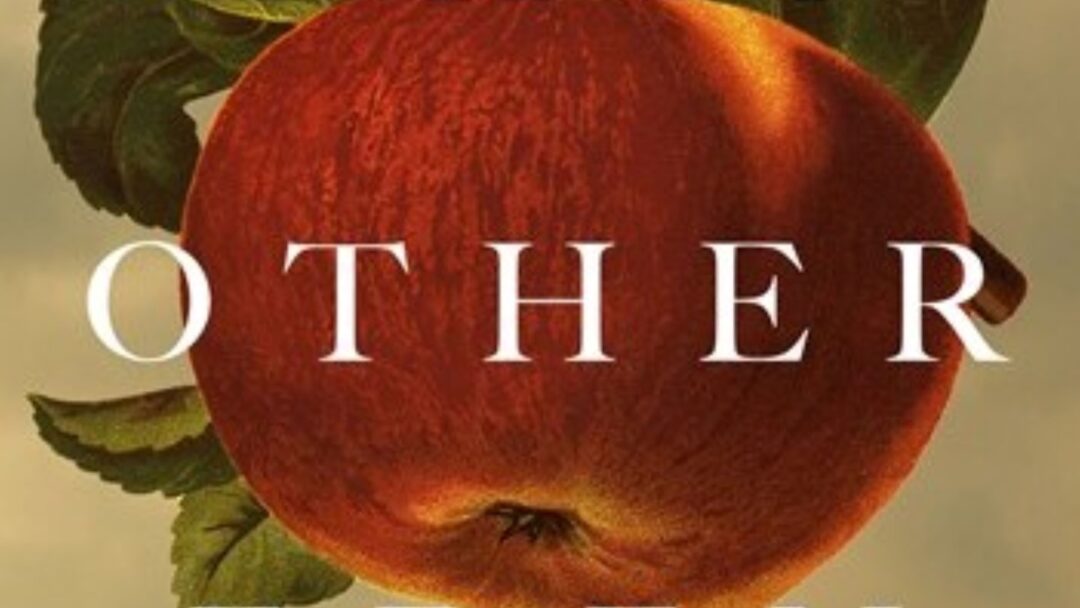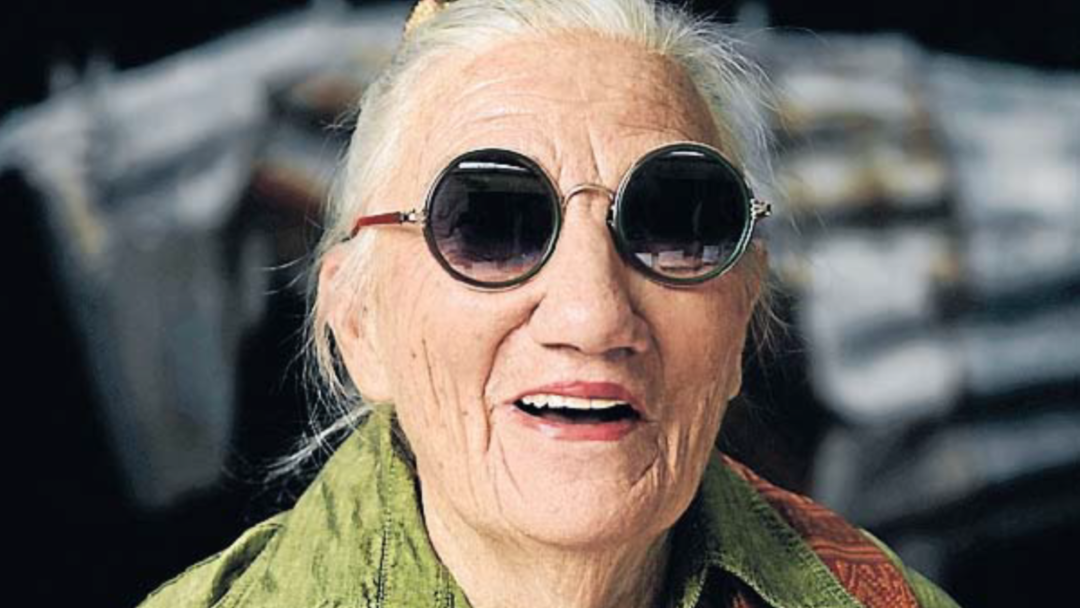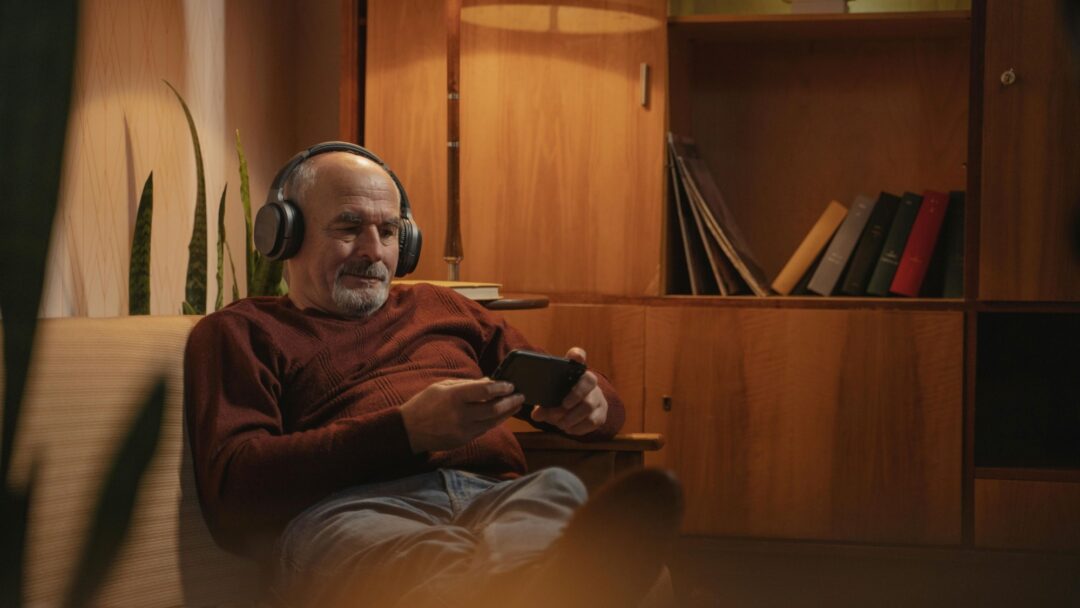Audio
World Sight Day and Barbra Streisand
Hear This by
Vision Australia3 seasons
4 October 2024
28 mins
Reviews and events at Vision Australia Library to mark World Sight Day, October 10.

Hear This is a weekly presentation updating publications and events in the Vision Australia Library. Host Frances Keyland presents reviews, readings and Reader Recommends.
This edition marks World Sight Day, October 10, with some events and reviews, and also includes a reading by singer Barbra Streisand from here memoir My Name is Barbra.
00:30 UU (THEME)
Let's. Take a look. To take a look inside the book. Take a look too...
00:50 S1
Hello and welcome to Hear this. I'm Frances Keyland, bringing you the Vision Australia Library show, talking about books in the Vision Australia library collection. And today we've got a nice array of books for you to listen to, so I hope you enjoy the show.
This year on October the 10th is World Sight Day, which is a global healthcare event celebrated on the second Thursday of every October to emphasise public awareness with respect to shedding light on the prioritizing of vision and eye health. There is a lot of information out there about vision loss. Vision Australia website - if you want to ever have a explore around there, it is accessible so you can have the high contrast if your vision needs that. And also, audio description of things.
A staff member at Vision Australia for many years, he's since retired was Cameron Algie, who I had the pleasure to talk with numerous times and even had book reviews by him on the show a couple of times. He has written a memoir, I Can See Clearly Now, but it's a bit more than a memoir - it's a bit of a handbook as well. This is a comprehensive, highly readable guide for the blind and vision impaired, their sighted families and friends, professionals, service providers and employers. It shows how someone can successfully adjust to vision impairment and dispels fears, misinformation and prejudices.
"This book has 18 chapters divided into three parts. In the first part, it looks at some of the main causes of vision loss and discuss the complex psychological aspects of blindness and how to overcome grief, fear, and anxiety. I also examine the disempowering nature of sighted people's attitudes, and explain how those with vision impairment can assert their own independence. In part two, I look at education, work, parenting, the teenage years, dating, gender, and schooling. To provide practical illustrations of how to manage sight loss, I use many insights gained from discussion groups to show the range and depth of experiences, insights and solutions in these important areas.
"Part three offers sensible advice on being independent in the home, keeping mobile, finding the latest technology and working with hobbies. Practical tips cover cooking, cleaning, applying makeup, shaving, working in the shed, shopping white canes, guide dogs, public transport apps and software, the best gadgets, and many more aspects affecting day to day life."
Let's hear a sample of I Can See Clearly Now by Cameron Algie. It's narrated by Barry LaVine.
03:37 S2
For over 26 years, while working as a lawyer and CEO, I lived in constant apprehension, if not all consuming dread of making mistakes or failing because of my poor sight brought about by my degenerative genetic condition. Having no central vision but quite reasonable peripheral sight, I lived in a limbo land, a world of neither being totally blind nor fully sighted, of being detached and yet connected, being complete and yet unfinished. Sometimes in my legal career, I went to court, so gripped by fear that I became debilitated with diarrhea and mentally paralyzed by fear brought on by nervousness.
These insecurities also contributed to a dramatic family breakup in 1999. While extremely arduous and not to be recommended, this experience actually prepared me well for the 14 years I was to later spend facilitating client peer support groups for people who were blind or vision impaired. This had the effect of normalising my own loss, and allowed me, for the first time, to work without fear of perceived judgment. As I listened to the many heartfelt and sometimes shocking stories of clients, I worked with them to solve their multifarious vision loss issues. In turn, these stories empowered me to give back to these wonderful people the insight I gained from them.
Retelling their stories explains why so much stigma and nonsense still surrounds vision loss, and that there is an ongoing need for greater enlightenment.
05:32 S1
And that was a sample of I Can See Clearly Now by Cameron Algie. Cameron is spelt [spells name]. And that book goes for 11 minutes. Oh, 11 hours, sorry. And nine minutes. And a worthwhile book to read. And Cameron was one of the most passionate people I know about sharing experiences and gathering knowledge from people with lived experience. So well done Cameron, for that. Thank you. And find out a little bit more if you want about what's happening worldwide or just in Australia for World Sight Day, October the 10th.
The next book is a memoir by the fabulous Barbra Streisand, and I'm so excited to see this. I think it was published last November, so I've been hanging out to see this in the collection, and it doesn't disappoint. It is narrated by the wonderful Barbra Streisand as well. It is called My Name Is Barbra. Barbra Streisand is, by any account a living legend, a woman who, in a career spanning six decades, has excelled in every area of entertainment. She's among the handful of Emmy, Grammy, Oscar and Tony winners, won all of those awards and has one of the greatest and most recognizable voices in popular music.
Streisand's memoir reveals a voice on the page that is every bit as heartfelt, entertaining, and spectacular as her best performances. There's the chilling story, which is never told before, of the origins of her legendary stage fright. There's a hilarious opening line to James Brolin, who she's been with for 27 years. There's a page and a half correcting the record on the Streisand Effect, a term that refers to the way efforts to minimise a story can backfire, generating exponentially more press. As Vanity Fair said, if Barbra could plug away for ten years, writing this exhaustive, exhilarating account of her life, then one can do her the courtesy of reading it from start to finish.
Let's hear a sample of My Name Is Barbra by Barbra Streisand. It's narrated by, as I said, Barbra Streisand.
07:43 S3
An amiable anteater. That's how I was described at 19 and one of my first reviews as a professional actress. I was in I Can Get It for You Wholesale, playing a lovelorn secretary, and I could see the comparison. Well, sort of. Over the next year, I was also called, let's see, a sour persimmon, a furious hamster, a myopic gazelle and a seasick ferret. Yikes. Was I really that odd looking? Only a year later, when I was in my second Broadway show, Funny Girl. My face was exactly the same, but now I was being compared to an ancient oracle. Nefertiti. And a Babylonian queen.
I must say, I love those descriptions. Apparently I also had a pharaonic profile and scarab eyes. I think that was supposed to be a compliment, though I have to admit, one of those eyes does look, well, a little cross-eyed at times. And it seems like the Pharaoh also had a big schnoz. Hahaha. People kept telling me get it fixed! I bet no one said that to him. Sometimes it felt like my nose got more press than I did in the cover story in time magazine, the writer said, this nose is a shrine. That sounds good. Then he went on, the face it divides is long and sad, and the look in repose is the essence of hound. Not so good.
So which is it? Am I a Babylonian queen or a basset hound? Probably both, depending on the angle. I wish I could say none of this affected me, but it did. Even after all these years, I'm still kind of hurt by the insults and can't quite believe the praise.
09:46 S1
And that was My Name is Barbra by Barbra Streisand. Barbra is spelt [spells name]. And that book is a long one. It goes for 48 hours and 20 minutes. I've listened to little bits and pieces of it. I think it's wonderful, even, whose speaking voice is quite distinctive. And at different times she'll be talking about a different song in this audiobook, and she'll play a sample of that song to kind of show. To give an example of what she's expressing, like if a song was a little bit emotionally difficult for her to sing, she'll play that a little snippet of that song so that you can hear that in her voice in the original recording. So I loved that about the book as well.
And another memoir by a not famous person, but an Australian memoir. And I thought this might interest some of the people out there if they've been interested in doing the memoir writing course or have done the memoir writing course. The title is The Love That Remains. After 20 years spent searching for her biological parents, 52 year old Susan Hull unexpectedly meets the great love of her life, a gold miner named Wayne Francis. He is a gentle giant of a man who promises Susan the world. Two years later, they throw in their jobs, marry and sell everything they own, embarking on an incredible adventure to start a new life in the romantic city of Granada, where they learn Spanish and enjoy too much tapas. In love and enthralled by the splendor of a European springtime, the pair treasure every moment together until a shocking series of events alters everything.
Riveting, heartfelt and remarkably honest, The Love That Remains explores unconditional love and the lies we tell to safeguard our happiness. Let's hear a sample of The Love That Remains by Susan Francis. It's narrated by Rachel Tidd.
11:46 S4
Here's the story I promised I would tell you, Wayne, about Aristophanes and his theory explaining love. He believed that we were created as two individuals attached back to back. Our separate faces looked in opposite directions. We shared four arms and four legs, and we spent our beautiful days cartwheeling around the world without thought. Then we became too happy for our own good. We assumed too much. The attempt to ascend to heaven was a step too far. Even happiness had boundaries. The gods took their revenge. They cleaved the one of us into two. And now? Now we're forever destined to spend our life roaming the world, searching for our soulmate, the other half of our true self. Because it's the only way we can be whole again.
Prologue. Granada, Spain January 2015. I have a clear memory of Wayne throwing his arm about my shoulders, the weight of him fixing me where I stood. Despite the climb, I couldn't stop shivering, so he rubbed my hands, tried to warm me up. Easiest lesson I learnt that year was how bitter Spain is in wintertime. Later, after hoisting my bags across a frozen puddle of water, I clambered after my husband as best I could till around another corner. We emerged into weak sunlight, choosing a courtyard, dandelions sprouting out of cracked cement in which to take a rest.
13:43 S1
And that was a sample of The Love That Remains by Susan Francis. Susan is [spells name]. And that book goes for seven hours and 40 minutes. Susan Francis is a writer, teacher, and editor, and holds a bachelor degree in English, a diploma in Secondary English teaching, and a master's degree in Australian Literature. The Love That Remains was published in 2020. The Australian Writers Centre... so Writers Centre dot comdot AU. They have a series of podcasts and one of them is Meet Susan Francis, author of the memoir Love That Remains, and there's other podcasts there as well. The written transcript. So it is in text as well.
And one of the events recently enjoyed by people on the 2nd of October was the appearance of Candace Fox here at the library, and available online as well, to be seen talking to the Library's Maureen O'Reilly that's now available to listen to. If you're a library member, you can download that. And Candace Fox's new book, High Wire, is also now available. You only take the high wire if you're desperate or up to no good. A notorious unmarked trek through outback Australia, the wire crosses slabs of lawless land, body dumping grounds and mobile phone black spots.
Harvey Buck is certainly desperate. Racing to be with his dying girlfriend. He encounters Claire Holland, whose car has broken down. He offers the hapless traveller a ride, and then their nightmare begins. The pair are ambushed by a vengeful crew and strapped into bomb vests as part of a deadly game Harvey and Claire are forced to commit a series of increasingly murderous missions or be blown to smithereens. Senior Sergeant Edna Norris is dealing with a runaway teenager, not an unusual job in the place people go to disappear, but an unfolding crime spree turns this outback cops night into a fight for survival. Hot on Harvey and Claire's trail, Edna finds a burned out car, a missing woman, a bank robbery and a bullet riddled body. And this road trip from hell has only just begun.
Let's hear a sample of High Wire by Candace Fox. It's narrated by Taylor Owens.
16:01 S5
There was a car on fire up ahead. Harvey stopped his vehicle, got out, looked all around, saw the same thing he'd been seeing for the past 3.5 hours. Emptiness. One flat black mass, slightly darker than the black mass blanketed over it, peppered with stars and milky galaxies he'd known the name of once the burning car was just a hazy dome of light rising beyond the curvature of the earth. Maybe a minute and a half on. Harvey had seen plenty of cars on fire from all possible distances. Knew that's what it was. Petrol stink and menace. Whispered past him on the wind.
He got back behind the wheel, gripped it and watched the dark shut his headlights off. A set up with a burning car was just the right kind of bullshit for the high wire. The secret track that cut through the Australian outback from Broome to Sydney had started out as a trucker only thing. A flat, even, mostly hazard free route that skirted indigenous conservation areas, cattle farms and small towns. It was far enough into the dusty, forgotten corners of the states that joined hands across it that each jurisdiction liked to think any problems on the wire weren't theirs.
Satellite coverage was patchy, and routine patrols weren't feasible. So after the truckers let slip about it, the track became party central for drug traffickers trying to move cargo from the south east corner of Australia to the north west, and for the bandits who wanted to take advantage of that. Bandits who liked to set cars on fire, draw people in, rob and murder them. Harvey had two choices now drive on or turn away.
17:49 S1
And that was High Wire by Candace Fox. Candace is spelt [spells author's name]. If you want to download the podcast with Candace Fox, you simply look for podcast Vision Australia Library In Conversation. So that's how it appears in the catalogue podcast Vision Australia Library In Conversation.
At the recent Australian Mystery Davitt Awards, Alison Goodman won the Reader's Choice Award for her crime novel The Benevolent Society of Ill Mannered Ladies. Welcome to the secret life of the Colebrook Twins. Unnoticed old maids to most but unseen champions to those in need, society be damned. Lady Augusta Colebrook Augusta is determinedly unmarried, bored by society life and tired of being dismissed. At the age of 42, she and her twin sister Julia, who is grieving her dead betrothed, need a distraction. One soon presents itself to rescue their friend's goddaughter, Caroline, from her violent husband.
The sisters set out to Caroline's country estate with a plan, but their carriage is accosted by a highwayman. In the scuffle, Gus accidentally shoots the ruffian, only to discover he is Lord Evan Belford, an acquaintance from their past who was charged with murder and exiled to Australia 20 years ago. With Lord Evan injured and unconscious, the sisters have no choice but to bring him on their mission to save Caroline. What follows is a high adventure full of danger, clever improvisation, heart racing, near-misses, and a little help from a revived and rather charming Lord Evan. And so begin the beguiling adventures of the Colebrook Twins.
Let's have a listen to The Benevolent Society of Ill Mannered Ladies by Alison Goodman. And this is part one in the Ill Mannered Ladies series, and it's narrated by Kristen Atherton.
19:50 S6
We were to meet him at midnight in the dark walk. It was not an ideal arrangement. Two unaccompanied women confronting a blackmailer in the most ill lit, deserted part of Vauxhall Gardens. Still, I had come prepared, more or less. Now all we had to do was wait until the hour was upon us. I angled my pendant watch at the oil lamps hanging high in the branch above my head, but could not make out the dainty face. The famous light show was near its end. The thousand or so colored lamps strung in festoons around the trees and pavilions had all begun to gutter. Well, for once, my unladylike height would be an advantage.
Raising myself onto tiptoes, I lifted the timepiece to the dying glow of the nearest lamp. Finally, a glint of gold hands. A quarter to midnight. I touched my sister's arm. She turned from watching the dancers silhouetted before the orchestra tower. Already? She asked over Mr. Handel's soaring music. It is at least ten minutes to the dark walk. She drew her lilac shawl tightly around her shoulders. Are you sure we should do this, Gussie? We cannot trust this man to keep his word, especially in such a lonely place. He could attack us. She was right. Mr. Harley had already proved himself dishonorable. And while the Dark walk had a reputation as an illicit meeting place for lovers, it also had a grim history of assaults upon women and sometimes even men.
21:44 S1
And that was a sample of The Benevolent Society of Ill Mannered Ladies by Alison Goodman, winner of the Davitt Awards Readers Choice Award for this year. Alison is [spells name]. And that book goes for 15.5 hours.
I'm going to go back to another memoir. Now this is by English musician Viv Albertine. It's called Clothes, Clothes, Clothes. Music, Music, Music. Boys, Boys, Boys. Viv Albertine is one of a handful of original punks who changed music and the discourse around it forever. Here, before and beyond the break up of The Slits in 1982 is the full story of a life lived unscripted with foolishness, bravery and great emotional honesty. Let's hear a sample of Clothes, Clothes, Clothes. Music, Music, Music. Boys, Boys, Boys by Viv Albertine. It's narrated by Jasmine Blackborow.
22:50 S7
1975. Every week I buy the NME. I find it difficult to read because the writers use such long words, but it's not a chore because I'm interested in what they're saying. One day I read a small piece about a singer called Patti Smith. There's a picture. It's the cover of horses, her forthcoming album. A black and white photograph taken by Robert Mapplethorpe. I have never seen a girl who looks like this. She is my soul made visible. All the things I hide deep inside myself that can't come out. She looks natural, confident, sexy and an individual. I don't want to dress like her or copy her style. She gives me the confidence to express myself in my own way.
On the day the album's released, I half dread it in case the music doesn't live up to the promise of that bold cover. I don't go into college. I get the bus to HMV Records in Oxford Street instead. I'm so excited. I feel sick when I arrive. I see Mick Jones loitering outside the record shop. What are you doing here? I ask, getting the Patti Smith record. I rush home and put the record on. It hurls through stream of consciousness careers into poetry and dissolves into sex. The structure of the songs is unique to her, not copies of old song structures. There a mixture of improvisation, landscapes, grooves, verses and choruses.
She's a private person who dares to let go in front of everyone, puts herself out there and risks falling flat on her face. Up until now, girls have been so controlled and restrained. Patti Smith is abandoned.
24:48 S1
And that was a sample of Clothes, Clothes, Clothes. Music, Music, Music. Boys, Boys, Boys. Viv Albertine, Viv is [spells author's name]. And I've read this book. It's really lovely and gossipy about the whole punk scene in London. So you hear little bits about Sid Vicious, quite a bit about Sid Vicious, because they did play together in a band very early in the days called Flowers of Romance. Also John Lydon, Johnny Thunders, Viv dated Mick Jones from The Clash. And of course, there's talk about her fellow Slits musicians Ari Up and Palmolive and Poly Styrene. And also Chrissie Hynde is is in there.
It was a kind of very small and united group, and she chronicles it very well. All these people that were aware that they were on the brink of a new sort of music, a new sort of movement, and where that went, where it peaked and kind of where it started to sour a little bit as well. And Viv's passion for music and for creativity comes through really strongly, like that very vivid impression that Patti Smith had on Viv. And that book goes for 13.5 hours.
And to finish off with, we have Jonathan Strange and Mr. Norrell. This is by Susanna Clarke, and this book celebrated its 20th anniversary this year. Centuries ago, when magic still existed in England. The greatest magician of all was the Raven King. Now, at the beginning of the 19th century, he is barely more than a legend, and England no longer believes in practical magic. Then the reclusive Mr. Norrell appears and causes the statues of York Cathedral to speak and move. Let's hear a sample of Jonathan Strange and Mr. Norrell by Susanna Clarke. It's narrated by David Thorpe.
26:47 S8
Some years ago there was in the city of York, a society of magicians. They met upon the third Wednesday of every month and read each other long, dull papers upon the history of English magic. They were gentlemen magicians, which is to say, they had never harmed anyone by magic, nor ever done anyone the slightest good, in fact, to own the truth. Not one of these magicians had ever cast the smallest spell, nor by magic caused one leaf to tremble upon a tree, made one mote of dust to alter its course, or changed a single hair upon anyone's head.
27:25 S1
And that was a sample of Jonathan Strange and Mr. Norrell by Susanna Clarke. Susanna is [spells name], and that book goes for 34 hours and 50 minutes. Another good long book to get your teeth into.
Thank you for joining us on Hear This Today. I'm Frances Keyland. If you'd like to ring the library or email them to let them know what you would like to hear samples of, if there's particular books or authors that you love, yes, you can always call the library on 1300 654 656. That's 1300 654 656. Or you can email the library@visionaustralia.org - that's library at Vision Australia dot org. Have a lovely week and we'll be back next week with more Hear This.
Continue listening

On Hear This, latest books in the Vision Australia library. This edition, award-winning Oz fiction.
Australian fiction
Hear This by Vision Australia
4/8/2023
•28 mins
Audio

Books from the Vision Australia library - this episode featuring memoirs and family histories.
Family histories
Hear This by Vision Australia
11/8/2023
•27 mins
Audio

This edition: Michael Parkinson remembered and an assortment of latest books from the Vision Australia library.
Vale Michael Parkinson
Hear This by Vision Australia
18/8/2023
•26 mins
Audio

Hear This reviews latest books from Vision Australia library - this edition starting with two Booker Prize aspirants.
Booker Prize hopefuls
Hear This by Vision Australia
25/8/2023
•27 mins
Audio

Hear This interviews Tracey Chevalier, author of Girl with a Pearl Earring.
Girl with a Pearl Earring
Hear This by Vision Australia
8/9/2023
•28 mins
Audio

Hear This samples a variety of audio books from the Vision Australia library.
Top picks from audio books
Hear This by Vision Australia
15/9/2023
•28 mins
Audio

Events and activities at Vision Australia library - and latest picks from its books.
Community engagement
Hear This by Vision Australia
22/9/2023
•27 mins
Audio

This edition of Hear This from the Vision Australia library opens with a discussion of banned books.
Banned books
Hear This by Vision Australia
6/10/2023
•28 mins
Audio

Hear This features latest books and events at the Vision Australia library.
Latest events and books
Hear This by Vision Australia
13/10/2023
•27 mins
Audio

Latest books from the Vision Australia library - including childhood tales and a John Grisham thriller.
Childhood tales and a Grisham thriller
Hear This by Vision Australia
20/10/2023
•28 mins
Audio

Latest books from the Vision Australia library - including a novel by Australian Sam Drummond.
Oz writer Sam Drummond
Hear This by Vision Australia
3/11/2023
•27 mins
Audio

Books from the Vision Australia library - including a memoir by a friend of Anne Frank.
Anne Frank's friend
Hear This by Vision Australia
10/11/2023
•28 mins
Audio

Book reviews and excerpts from Vision Australia library - including a wartime struggle for survival.
Survival in wartime
Hear This by Vision Australia
24 November 2023
•27 mins
Audio

A special seasonal edition reviews Christmas murder stories available from Vision Australia library.
Yuletide Homicide
Hear This by Vision Australia
8 December 2023
•28 mins
Audio

Veteran talking book reader Tony Porter reviews his many voices.
The many voices of Tony Porter
Hear This by Vision Australia
5 January 2024
•27 mins
Audio

What's new in Vision Australia library of Braille and audio books - including new Australian works.
New Australian books
Hear This by Vision Australia
12 January 2024
•28 mins
Audio

Vision Australia librarian talks of coming events and latest books for people with blindness and low vision.
Coming events and new books
Hear This by Vision Australia
26 January 2024
•28 mins
Audio

Review of books from the Vision Australia library - from a broad international range.
Books from Japan, US, Australia and Sweden
Hear This by Vision Australia
2 February 2024
•27 mins
Audio

New books in the Vision Australia library - from E.L.Doctorow to Alan Bennett.
Reasons Not to Worry, Wild Things... and Alan Bennett
Hear This by Vision Australia
9 February 2024
•28 mins
Audio

Latest events and books from Vision Australia Library, featuring its Community Engagement Co-ordinator.
Vision Library latest with Leeanne
Hear This by Vision Australia
16 February 2024
•28 mins
Audio

Features Jamie Kelly of Vision Australia Library, updating us on its website catalogue. And other new books.
Vision Australia library online, and Jelena Dokic
Hear This by Vision Australia
23 February 2024
•29 mins
Audio

New books in the Vision Australia Library - in this edition, books about paintings.
Books about paintings
Hear This by Vision Australia
1 March 2024
•26 mins
Audio

From the Vision Australia Library, women's memoirs on International Women's Day.
Women's memoirs on IWD
Hear This by Vision Australia
8 March 2024
•28 mins
Audio

Coming events and books at Vision Australia Library for people with blindness or low vision.
Coming events at Vision Library - and a Kerouac classic
Hear This by Vision Australia
15 March 2024
•29 mins
Audio

Latest books from Vision Australia Library - this week, some top Oz and worldwide novels.
Top Oz and world novels
Hear This by Vision Australia
29 March 2024
Audio

Coming events at Vision Australia Library in connection with the Melbourne Writers' Festival.
Melbourne Writers' Festival
Hear This by Vision Australia
5 April 2024
•28 mins
Audio

Coming events and new books at the Vision Australia Library for blind and low vision people.
Event update and more new books
Hear This by Vision Australia
12 April 2024
•29 mins
Audio

How printed works are brought to life as audio books in the Vision Australia Library.
Audio book narrators
Hear This by Vision Australia
19 April 2024
•28 mins
Audio

ANZAC Day edition of this series from the Vision Australia library for people with blindness or low vision.
ANZAC sniper
Hear This by Vision Australia
26 April 2024
•28 mins
Audio

From the Vision Australia library: a South African childhood, AI issues and an American First Lady.
Apartheid, AI and Michelle Obama
Hear This by Vision Australia
3 May 2024
•27 mins
Audio

Forthcoming Vision Library events including those connected with the Melbourne Writers' Festival.
Melbourne Writers' Festival and Vision Library events
Hear This by Vision Australia
10 May 2024
•28 mins
Audio

Murder mystery novels available from the Vision Australia library are reviewed and sampled.
Murder mysteries
Hear This by Vision Australia
24 May 2024
•27 mins
Audio

Celebrating National Reconciliation Week with books from Vision Australia Library... plus some user favourites.
Reconciliation Week and Reader Recommends
Hear This by Vision Australia
31 May 2024
•27 mins
Audio

Reader Recommends and crime fiction from the Vision Australia library for blind and low vision people.
This Other Eden... and some other readin'!
Hear This by Vision Australia
7 June 2024
•29 mins
Audio

Vision Library's coming community events and latest books for people with blindness or low vision.
Coming events and latest books
Hear This by Vision Australia
14 June 2024
•29 mins
Audio

Books in Vision Australia library for people with impaired vision - this time on the theme of Darkness.
Darkness
Hear This by Vision Australia
21 June 2024
•29 mins
Audio

New books in Vision Library including the Wikileaks founder's autobiography.
Julian Assange - by the man himself
Hear This by Vision Australia
28 June 2024
•29 mins
Audio

Community events soon to happen at Vision Australia Library for people with blindness and low vision.
Coming events at Vision Australia Library
Hear This by Vision Australia
5 July 2024
•28 mins
Audio

Two well-known authors open the latest look at new publications in the Vision Australia Library.
Hilary Mantel, Bret Easton Ellis and more
Hear This by Vision Australia
19 July 2024
•27 mins
Audio

Vision Library series, this episode features new Australian crime novels written by women.
Australian sisters in crime
Hear This by Vision Australia
26 July 2024
•28 mins
Audio

Latest publications in the Vision Library, starting with a biography of John Farnham.
He's the Voice
Hear This by Vision Australia
2 August 2024
•27 mins
Audio

Latest reviews and readings from publications in the Vision Library for people with print disabilities.
Race, history and Black Ducks
Hear This by Vision Australia
9 August
•28 mins
Audio

Books from Vision Library reviewed include a Julie Andrews memoir, Guardian newspaper picks and more.
Julie remembers and The Guardian recommends
Hear This by Vision Australia
30 August 2024
•27 mins
Audio

An Australian author discusses her works, plus reviews of other books in the Vision Library.
Jane Rawson - author
Hear This by Vision Australia
6 September 2024
•28 mins
Audio

Update on forthcoming events and available publications at the Vision Australia Library.
What's On at Vision Australia Library
Hear This by Vision Australia
13 September 2024
•27 mins
Audio

Accessible Vision Library books reviewed, including murder mysteries and award nominees.
Mysteries and prize contenders
Hear This by Vision Australia
20 September
•27 mins
Audio

Reviews and events at Vision Australia Library to mark World Sight Day, October 10.
World Sight Day and Barbra Streisand
Hear This by Vision Australia
4 October 2024
•28 mins
Audio

What's on in the Vision Library, and the works of Ira Levin and Han Kang.
Library events, Ira Levin and Han Kang
Hear This by Vision Australia
11 October 2024
•28 mins
Audio

Vision Library publications reviewed - opening with some tributes to writers passed.
Tributes, and more
Hear This by Vision Australia
18 October 2024
•28 mins
Audio

Reviews and readings from Australian, British and US books in the Vision Australia Library.
Tomorrow, Questions, Mistresses and Murder
Hear This by Vision Australia
25 October 2024
•28 mins
Audio

Reviews and readings from books available in the Vision Australia Library.
From Australian thrillers to the US and South Africa
Hear This by Vision Australia
1 November 2024
•28 mins
Audio

A wide range of books in the Vision Australia Library are reviewed and sampled.
Leonard Cohen, ghosts and Broken Hill
Hear This by Vision Australia
8 November 2024
•28 mins
Audio

Events and publications at Vision Australia Library for people with blindness or low vision.
Vision Library: what's in and what's on
Hear This by Vision Australia
15 November 2024
•28 mins
Audio

Interview with an award-winning author about her life and work... plus more publications in the Vision Australia Library.
Jacqueline Bublitz
Hear This by Vision Australia
22 November 2024
•28 mins
Audio

Vision Australia Library for people with vision impairment updates its coming events and latest publications.
Coming soon to the Vision Library
Hear This by Vision Australia
13 December 2024
•28 mins
Audio

Christmas-themed books in the Vision Australia Library for people with vision impairment.
Christmas offerings
Hear This by Vision Australia
20 December 2024
•28 mins
Audio

New books for 2025, fiction and non-fiction - vale Leunig!
Fiction and non-fiction for the New Year
Hear This by Vision Australia
3 January 2025
•27 mins
Audio

Reviews of varied books from the Vision Library - some centring on radio stations or radio plays.
Radio drama
Hear This by Vision Australia
10 January 2025
•29 mins
Audio

What's On at Vision Australia Library - and latest publications accessible to people with blindness and low vision.
Coming events in 2025 - and latest publications
Hear This by Vision Australia
24 January 2025
•28 mins
Audio

Writings on Marianne Faithfull and award-contending works in the Vision Australia Library are reviewed.
Vale Marianne... and award-nominated books
Hear This by Vision Australia
31 January 2025
•28 mins
Audio

Special guest highlights interesting events in libraries around the country... and some new books.
What's new in libraries around Australia
Hear This by Vision Australia
7 February 2025
•27 mins
Audio

Accessible publications chosen for February 14: Library Lovers' Day, Valentines Day and World Radio Day.
Library Lovers' Day
Hear This by Vision Australia
14 February 2025
•29 mins
Audio

An update on Vision Australia Library's coming events and latest blind-accessible books.
Coming events and new books
Hear This by Vision Australia
25 February 2025
•29 mins
Audio

Reviews of accessible books including a John Steinbeck classic, and news of a forthcoming writers' festival.
Brimbank and Steinbeck
Hear This by Vision Australia
28 February 2025
•29 mins
Audio

Coming courses and other events at Vision Australia Library - and latest accessible books.
Courses, events and latest publications
Hear This by Vision Australia
14 March 2025
•28 mins
Audio

Special with interviews and readings at a writers' festival and writing competition in Melbourne.
Brimbank Writers' and Readers' Festival and Micro-fiction Competition
Hear This by Vision Australia
21 March 2025
•30 mins
Audio

An interview with an Australian woman writer and reviewer, about her favourite female authors.
Women authors with Stella Glorie
Hear This by Vision Australia
28 March 2025
•29 mins
Audio

Reviews and excerpts from accessible works in the Vision Australia Library, starting with a new Australian novel.
Reader recommends a Deal
Hear This by Vision Australia
4 April 2025
•27 mins
Audio

Vision Australia Library brings news of accessible events at the forthcoming Melbourne Writers' Festival.
Melbourne Writers' Festival 2025
Hear This by
11 April 2025
Audio

Vision Australia Library pays tribute to the late Australian author of the Miss Fisher mysteries and more.
Vale Kerry Greenwood
Hear This by Vision Australia
18 April 2025
•28 mins
Audio

ANZAC Day special featuring reviews and short readings from books about the First World War.
Reading about World War 1
Hear This by Vision Australia
25 April 2025
•28 mins
Audio

Reviews and readings of user favourites in Vision Library - including an Antarctic adventure.
Reader recommended
Hear This by Vision Australia
2 May 2025
•28 mins
Audio

What's accessible in the Vision Australia Library - including new books by Kate Grenville and Eric Idle.
Always look on the bright side of... time and place
Hear This by Vision Australia
9 May 2025
•29 mins
Audio

First part of an interview with an Australian author, military historian and war veteran.
Barry Heard's true tales of war (part 1)
Hear This by Vision Australia
16 May 2025
•28 mins
Audio